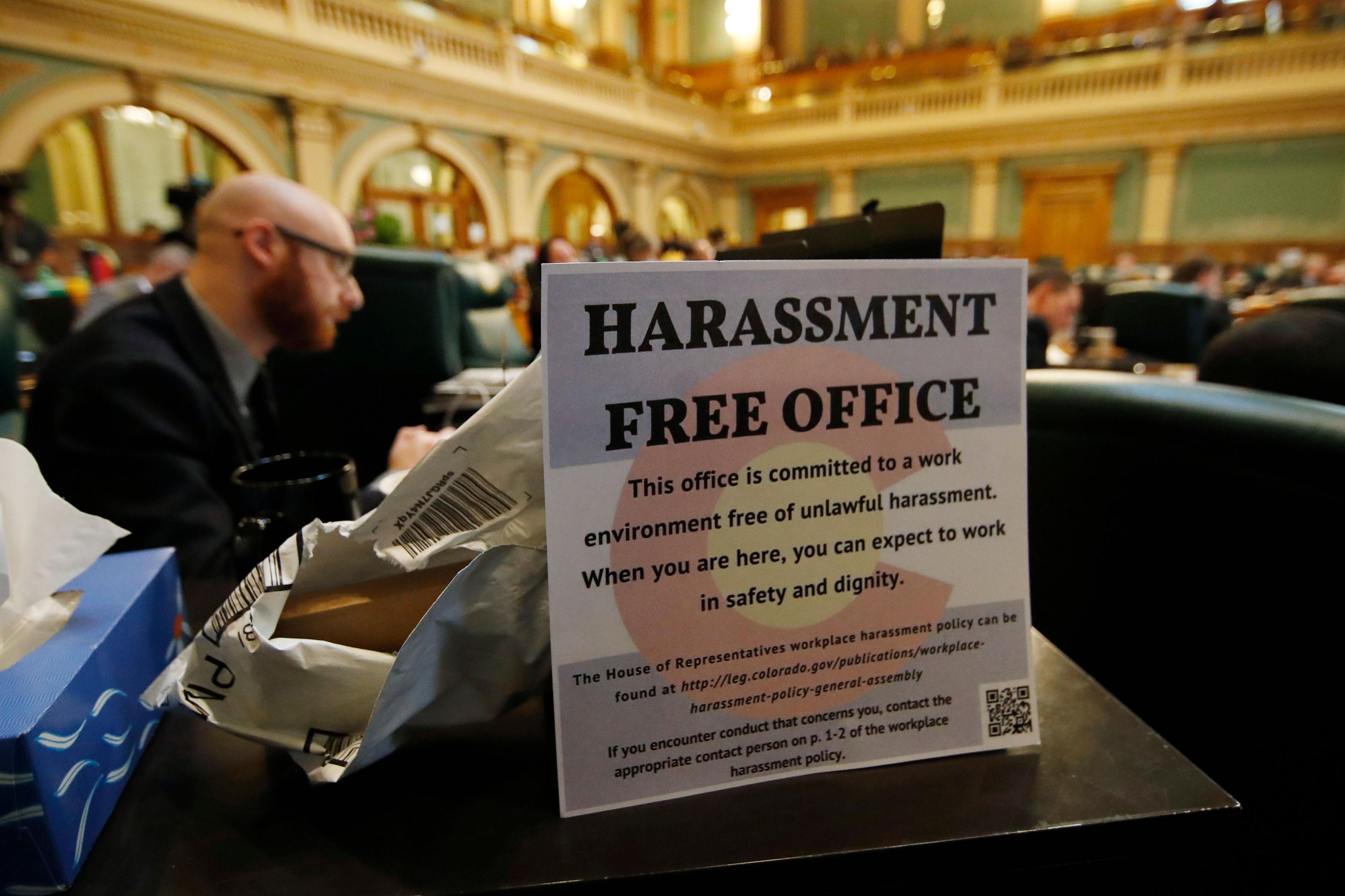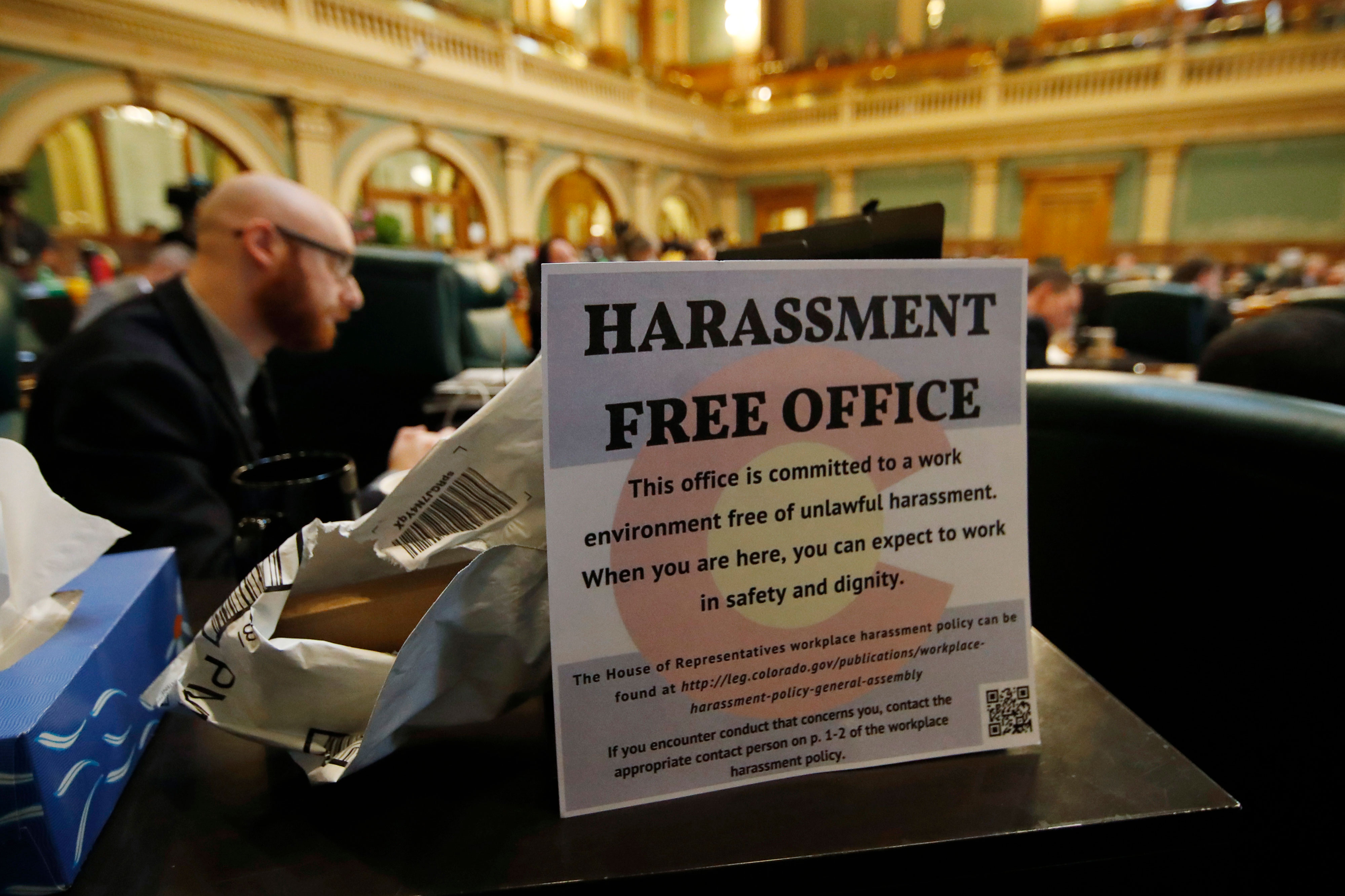

The Colorado legislature will soon discuss broad changes to how it handles workplace harassment complaints at the state Capitol. Lawmakers had originally pledged to pass the changes by last May after a series of sexual harassment allegations roiled the statehouse.
The aim is to streamline and speed up the reporting process, make credible complaints against state lawmakers public and beef up confidentiality protections for accusers. The new policy would also apply to the hundreds of lobbyists who work under the gold dome, should they ever be accused of harassment.
Discussions on the Capitol’s workplace culture dominated the 2018 legislative session. The House voted to remove Democratic Rep. Steve Lebsock from office over a number of sexual harassment complaints — the first expulsion of a sitting state lawmaker in over a century. By the end of the session, allegations from more than a dozen people against four other state lawmakers were investigated, and all were found to be credible.
Accusers who filed complaints described that process as grueling, partisan, uncertain, inconsistent and secretive. So they pushed for it to change.
“The most important part of this bill is really trying to depoliticize the process as much as possible,” said Sen. Faith Winter, a Democrat from Westminster. That’s not an easy feat in the state’s most political building.
Winter was the first to come forward in November 2017 with her accusation against Lebsock. Part of his expulsion vote centered on an investigator’s determination that it was more likely than not he harassed and also retaliated against his accusers, including Winter.
She will be the main sponsor of the legislation, which she expects to introduce shortly. Some of the ideas stem from a workplace study committee that met after last session. One major change: complaints against lawmakers would no longer go through legislative leaders.
Instead, an accuser would file a report with human resources and an outside entity would investigate. From there, a legislative committee would review the investigation and recommend consequences to the leader of the chamber the lawmaker serves in. The committee would include one member from each caucus, an HR expert, an employment attorney and a victim advocate.
“They would then determine if that legislator violated the policy and release the summary of that report,” Winter said. The accuser’s name would not be released.
Right now workplace harassment complaints and investigations are exempt from Colorado’s open records laws. Last session the public learned of allegations when the accusers released information to KUNC radio. This bill would not ban anyone from talking to the media at any point in the process.
Former lobbyist Holly Tarry, who also filed a sexual harassment complaint against Lebsock, said lawmakers “really seem to be focused on culture change, which I think is going to be so important for making the capitol a safer place and a better place to work.”
“For me, the most important part of this is that now we will know if a lawmaker has a credible substantiated complaint come through, that the public gets to know about that,” she said.
Since allegations first came to light at the capitol, Colorado has spent more than $275,000 dealing with workplace harassment. That includes everything from attorneys’ fees to sexual harassment training, consultants to staffing, and the legislature’s first human resources hire last session. Winter’s workplace harassment bill would expand the number of HR staff.
How Much Anonymity for Accusers?
Yet there are already disagreements over potential changes to the workplace harassment policy. Republican Sen. Bob Gardner of Colorado Spring doesn’t think outside experts should serve on a committee with lawmakers and vote on a potential punishment for a legislator or lobbyist.
“The General Assembly is responsible for disciplining itself,” he said. “I’m not suggesting to you that the General Assembly has always done that well, but the Constitution vests that in us as a body and as members and we ought to accept that responsibility and be accountable to our constituents.”
Gardner also wants the accuser’s name to be revealed to the committee of lawmakers. Under Winter’s bill, only the HR person, investigator, and the accused individual would know the accuser’s name.
“I know of no other proceeding anywhere where the fact finders or the board that recommends an outcome isn’t privy to the name and identity of both the complainant and the respondent,” Gardner said. “I have serious... due process concerns about that.”
Accusers who’ve come forward in the past say protecting anonymity as much as possible is key. The proposal also aims to make the rules against retaliation more stringent. Victims are often reluctant to come forward because they fear for their political and professional future; they worry the likelihood of retaliation will increase if more people who know who they are.
“I know, especially in my case, when an aide came out with some pretty nasty things to say about me in the media — that would be covered [under this new policy],” said former intern Danielle Giffin. She filed a sexual harassment complaint against Republican Sen. Jack Tate, and has remained anonymous up until now, but has been afraid her name would become public without her consent.
Tate has said he will not seek re-election in 2020 in order to better meet his personal financial obligations.
‘You Can’t Teach An Old Dog New Tricks’
In 2018 Investigations Law Group, a consultant the state hired, interviewed 500 people who worked at the capitol. They found 87 percent of those who said they experienced harassment didn’t report it. And of those that did, 72 percent weren’t happy with how it was handled.
The new workplace policy would add a completely anonymous informal complaint process to allow concerns to be raised about someone without triggering an investigation or the release of information. Legislative leaders, however, would have access to the number of informal complaints in a lawmaker’s file, allowing them to potentially spot troubling patterns.
While accusers largely praised efforts to try to improve the current system, some felt it falls short. They would rather see everything routed through HR and don’t feel lawmakers can fairly or objectively recommend consequences.
Others questioned why a bill wasn’t introduced in January if this issue was such a top priority for Democrats who hold the majority in both the House and Senate. Even if lawmakers pass the changes it’s unlikely all the pieces will be in place for it to take effect this legislative session.
One accuser sees a new policy as more about making the workplace better for future aides, interns and lobbyists, but not necessarily improving the behavior of the lawmakers working at the state capitol now. “You can’t teach an old dog new tricks,” they said.









